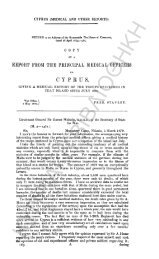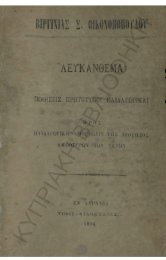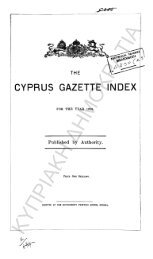- Page 1 and 2:
• • • * , .^ •^1..,'hrm ",1
- Page 3 and 4:
THECYPRUS GAZETTE INDEXFOR THE YEAR
- Page 5:
THEOYPRUS GAZETTE INDEX, 1918.ANTIQ
- Page 8 and 9:
THE CYPRUS QAZETTE INDEX, 1918.PAGS
- Page 10 and 11:
PROCLAMATIONS—continued.THE CYPRU
- Page 12 and 13:
2 THE CYPRUS GAZETTE (EXTRAORDINARY
- Page 14 and 15:
THE CYPRUS GAZETTE, llth JANUARY, 1
- Page 16 and 17:
6 THE CYPRUS GAZETTE, llth JANUARY.
- Page 18 and 19:
8 THE CYPRUS GAZETTE, llth JANUARY,
- Page 20 and 21:
ΚΥΠΡΙΑΚΗ ΔΗΜΟΚΡΑΤΙ
- Page 22 and 23:
ΚΥΠΡΙΑΚΗ ΔΗΜΟΚΡΑΤΙ
- Page 24 and 25:
14 THE CITRUS GAZETTE. 25th JANUARY
- Page 26 and 27:
16 THE CYPRUS GAZETTE, 25th JANUARY
- Page 28 and 29:
18 THE CYPRUS GAZETTE. 25th JANUARY
- Page 30 and 31:
•20 THE CYPRUS GAZETTE. 25ih JANU
- Page 32 and 33:
No. 243 in Class 47 in respect of C
- Page 34 and 35:
21 THE CYPRUS GAZETTE EXTRAORDINARY
- Page 36 and 37:
ΚΥΠΡΙΑΚΗ ΔΗΜΟΚΡΑΤΙ
- Page 38 and 39:
28 THE CYPRUS GAZETTE, 8th FEBRUARY
- Page 40 and 41:
30 THE CYPRUS GAZETTE. 8th FEBRUARY
- Page 42 and 43:
32 THE CYPRUS GAZETTE. Sth FEBRUARY
- Page 44 and 45:
34 THE CYPRUS GAZETTE, Sth FEBRUARY
- Page 46 and 47:
NO. 243 in Class 47 in respect of C
- Page 48 and 49:
Xo. 264 in Class 47 in nsixri of Ca
- Page 50 and 51:
10 THE CYPRUS GAZETTE I^EXTRAOKDINA
- Page 52 and 53:
42 THE CYPRUS GAZETTE. 22nd FEBRUAR
- Page 54 and 55:
44 THE CYPRUS GAZETTE, 22iid FEBRUA
- Page 56 and 57:
46 THE CYPRUS GAZETTE. 22nd FEBRUAR
- Page 58 and 59:
ΚΥΠΡΙΑΚΗ ΔΗΜΟΚΡΑΤΙ
- Page 60 and 61:
No. 24:') ill Class 47 in resj^ect
- Page 62 and 63:
No. 264 in Class 47 in rtsixi.t of
- Page 64 and 65:
54 THE CYPRUS GAZETTE
- Page 66 and 67:
ΚΥΠΡΙΑΚΗ ΔΗΜΟΚΡΑΤΙ
- Page 68 and 69:
58 THE CYPRUS GAZETTE, Sth MARCH, 1
- Page 70 and 71:
60 THE CYPKUS (rAZETTE, 8th MARCH.
- Page 72 and 73:
ΚΥΠΡΙΑΚΗ ΔΗΜΟΚΡΑΤΙ
- Page 74 and 75:
Xo. 25.") in Class 47 in respect of
- Page 76 and 77:
ΚΥΠΡΙΑΚΗ ΔΗΜΟΚΡΑΤΙ
- Page 78 and 79:
ΚΥΠΡΙΑΚΗ ΔΗΜΟΚΡΑΤΙ
- Page 80 and 81:
70 THE CYPRUS GAZETTE, 22nd MARCH,
- Page 82 and 83:
72 THE CYPRUS GAZETTE, 22nd MARCH,
- Page 84 and 85:
ΚΥΠΡΙΑΚΗ ΔΗΜΟΚΡΑΤΙ
- Page 86 and 87:
ΚΥΠΡΙΑΚΗ ΔΗΜΟΚΡΑΤΙ
- Page 88 and 89:
'8 THE CYPRUS GAZETTE, 5th APRIL, 1
- Page 90 and 91:
80 THE CYPRUS GAZETTE. .•,th APRI
- Page 92 and 93:
SL>THE CYPRUS GAZETTE. 5th APRIL, 1
- Page 94 and 95:
84 THE CYPRUS GAZETTE. 5th APRIL, 1
- Page 96 and 97:
86 THE CYPRUS GAZETTE, 5th APRIL. 1
- Page 98 and 99:
Short titleAppropriation of£30,675
- Page 100 and 101:
A BILL.To AMEXD THE PENSIONS LAW.BE
- Page 102 and 103:
ΚΥΠΡΙΑΚΗ ΔΗΜΟΚΡΑΤΙ
- Page 104 and 105:
94 THE CYPRUS GAZETTE EXTRAORDINARY
- Page 106 and 107:
ΚΥΠΡΙΑΚΗ ΔΗΜΟΚΡΑΤΙ
- Page 108 and 109:
98 THE CYPRUS GAZETTE (^EXTRAORDINA
- Page 110 and 111:
100 THE CYPRUS GAZETTE (EXTRAORDINA
- Page 112 and 113:
102 THE CYPRUS GAZETTE, 19th APRIL,
- Page 114 and 115:
104 THE CYPRUS GAZETTE, 19th APRIL,
- Page 116 and 117:
106 THE CYPRUS GAZETTE, 19th APRIL,
- Page 118 and 119:
108 THE CYPRUS GAZETTE. 19th APRIL,
- Page 120 and 121:
110 THE CYPRUS GAZETTE, 19th APRIL,
- Page 122 and 123:
112 THE CYPRUS GAZETTE, 19th APRIL,
- Page 124 and 125:
114 THE CYPRUS GAZETTE, 19th APRIL,
- Page 126 and 127:
ΚΥΠΡΙΑΚΗ ΔΗΜΟΚΡΑΤΙ
- Page 128 and 129:
ΚΥΠΡΙΑΚΗ ΔΗΜΟΚΡΑΤΙ
- Page 130 and 131:
lL>0 THE CYPRUS GAZETTE ^EXTRAORDIN
- Page 132 and 133:
122 THE CYPRUS GAZETTE, 3rd MAY, 19
- Page 134 and 135: ILM THE CYPRUS GAZETTE, 3rd MAY, 19
- Page 136 and 137: 126 THE CYPRUS GAZETTE, Srd MAY, 19
- Page 138 and 139: 128 THE CYPRUS GAZETTE, 3rd MAY. 19
- Page 140 and 141: 130 THE CYPRUS GAZETTE, 3rd MAY, 19
- Page 142 and 143: 132 THE CYPRUS GAZETTE. Brd MAY, 19
- Page 144 and 145: 134 THE CYPRUS GAZETTE, 3rd MAY, 19
- Page 146 and 147: 136RTHE CYPRUS GAZETTE, Srd MAY, 19
- Page 148 and 149: Short ilUeinationo^£30,675 fortwel
- Page 150 and 151: Procoringdefilementof womanby threa
- Page 152 and 153: ΚΥΠΡΙΑΚΗ ΔΗΜΟΚΡΑΤΙ
- Page 154 and 155: ΚΥΠΡΙΑΚΗ ΔΗΜΟΚΡΑΤΙ
- Page 156 and 157: 146 THE CYPRUS GAZETTE, IZth MAY, 1
- Page 158 and 159: U8 THE CYPRUS GAZETTE, 17th MAY, 19
- Page 160 and 161: U50THE CYPRUS GAZETTE, 17th MAY, 19
- Page 162 and 163: Amendment 5. The Principal Law, Sec
- Page 164 and 165: ΚΥΠΡΙΑΚΗ ΔΗΜΟΚΡΑΤΙ
- Page 166 and 167: 156 THE CYPRUS GAZETTE, Slst MAY, 1
- Page 168 and 169: 1.5S THE CYPRrS GAZKTTE, aist MAY.
- Page 170 and 171: 160 THE CYPRUS GAZETTE, .^st MAY, 1
- Page 172 and 173: 162 THE CYPRUS GAZETTE, Slst MAY, 1
- Page 174 and 175: 164 THE CYPRUS GAZETTE, Slst MAY, 1
- Page 176 and 177: ΚΥΠΡΙΑΚΗ ΔΗΜΟΚΡΑΤΙ
- Page 178 and 179: 3. As amended by this Deed, the Pri
- Page 180 and 181: ΚΥΠΡΙΑΚΗ ΔΗΜΟΚΡΑΤΙ
- Page 182 and 183: 172 THE CYPRUS OAZETTE ^EXTRAORDINA
- Page 186 and 187: 17« THE CYPRUS GAZETTE (EXTRAORDIN
- Page 188 and 189: 178 THE CYPRUS GAZETTE (EXTRAORDINA
- Page 190 and 191: 180ChargeRepeals.Rules.Declaration
- Page 192 and 193: ΚΥΠΡΙΑΚΗ ΔΗΜΟΚΡΑΤΙ
- Page 194 and 195: 184 THE CYPRUS GAZETTE, Uth JUNE, 1
- Page 196 and 197: 186 THE CYPRUS GAZETTE. Uth JUNE, 1
- Page 198 and 199: ΚΥΠΡΙΑΚΗ ΔΗΜΟΚΡΑΤΙ
- Page 200 and 201: 190 THE CYPRUS GAZETTE. 28th JUNE.
- Page 202 and 203: 192 THE CYPRUS GAZETTE, 28th JUNE.
- Page 204 and 205: ΚΥΠΡΙΑΚΗ ΔΗΜΟΚΡΑΤΙ
- Page 206 and 207: ΚΥΠΡΙΑΚΗ ΔΗΜΟΚΡΑΤΙ
- Page 208 and 209: 198 THE CYPRUS GAZETTE, 12th JULY,
- Page 210 and 211: ΚΥΠΡΙΑΚΗ ΔΗΜΟΚΡΑΤΙ
- Page 212 and 213: ΚΥΠΡΙΑΚΗ ΔΗΜΟΚΡΑΤΙ
- Page 214 and 215: 204 THE CYPRUS GAZETTE (EXTRAORDINA
- Page 216 and 217: 206 THE CYPRUS GAZETTE (EXTRAORDINA
- Page 218 and 219: 208 THE CYPRUS GAZETTE (EXTRAORDINA
- Page 220 and 221: 210 THE CYPRUS GAZETTE, 2^th JULY,
- Page 222 and 223: 211' THE CYPRUS GAZETTE, 26th JULY,
- Page 224 and 225: 214 THE CYPRUS GAZETTE, 26th JULY,
- Page 226 and 227: ΚΥΠΡΙΑΚΗ ΔΗΜΟΚΡΑΤΙ
- Page 228 and 229: 218 THE CYPRUS GAZETTE, 9th AUGUST,
- Page 230 and 231: 220 THE CYPRUS GAZETTE, 9th AUGUST,
- Page 232 and 233: 222 THE CYPRUS GAZETTE, 9th AUGUST,
- Page 234 and 235:
ΚΥΠΡΙΑΚΗ ΔΗΜΟΚΡΑΤΙ
- Page 236 and 237:
226 THE CYPRUS GAZETTE, 23rd AUGUST
- Page 238 and 239:
228 THE CYPRUS GAZETTE, 23rd AUGUST
- Page 240 and 241:
230 THE CYPRUS GAZETTE, 23rd AUGUST
- Page 242 and 243:
232 THE CYPRUS GAZETTE, 23rd AUGUST
- Page 244 and 245:
234 THE CYPRUS GAZETTE. 23rd AUGUST
- Page 246 and 247:
236 THE CYPRUS GAZETTE (EXTRAORDINA
- Page 248 and 249:
238 THE CYPRUS GAZETTE, 6th SEPTEMB
- Page 250 and 251:
240 THE CYPRUS GAZETTE, 6th SEPTEMB
- Page 252 and 253:
242 THE CYPRUS GAZETTE, 6th SEPTEMB
- Page 254 and 255:
244 THE CYPRUS GAZETTE, 6th SEPTEMB
- Page 256 and 257:
246 THE CYPRUS GAZETTE. 6th SEPTEMB
- Page 258 and 259:
ΚΥΠΡΙΑΚΗ ΔΗΜΟΚΡΑΤΙ
- Page 260 and 261:
250 THE CYPRUfS GAZETTE. 20th SEPTE
- Page 262 and 263:
ΚΥΠΡΙΑΚΗ ΔΗΜΟΚΡΑΤΙ
- Page 264 and 265:
254 THE CYPRUS GAZETTE (EXTRAORDINA
- Page 266 and 267:
ΚΥΠΡΙΑΚΗ ΔΗΜΟΚΡΑΤΙ
- Page 268 and 269:
ΚΥΠΡΙΑΚΗ ΔΗΜΟΚΡΑΤΙ
- Page 270 and 271:
260 THE CYPRUS GAZETTE, 4th OCTOBER
- Page 272 and 273:
262 THE CYPRUS GAZETTE, 4th OCTOBER
- Page 274 and 275:
264 THE CYPRUS GAZETTE. 4th OCTOBER
- Page 276 and 277:
NO. *7J' in Cks* 47 m respect of aH
- Page 278 and 279:
No. 285 in Class 48 in respect of a
- Page 280 and 281:
270 THE CYPRUS GAZETTE, 18th OCTOBE
- Page 282 and 283:
ΚΥΠΡΙΑΚΗ ΔΗΜΟΚΡΑΤΙ
- Page 284 and 285:
No. 278 in Class 47 in respect of a
- Page 286 and 287:
No. 285 in Claas 48 in respect of a
- Page 288 and 289:
278 THE CYPRUS GAZETTE (EXTRAORDINA
- Page 290 and 291:
280 THE CYPRUS GAZETTE, 1st NOVEMBE
- Page 292 and 293:
282 THE CYPRUS GAZETTE, 1st NOVEMBE
- Page 294 and 295:
284 THE CYPRUS GAZETTE, 1st XOVEMBE
- Page 296 and 297:
No. 281 in Class 47 in respect of a
- Page 298 and 299:
No. 285 in Class 48 in respect of a
- Page 300 and 301:
29 THE CYPRUS GAZETTE, 15th NOVEMBE
- Page 302 and 303:
ΚΥΠΡΙΑΚΗ ΔΗΜΟΚΡΑΤΙ
- Page 304 and 305:
ΚΥΠΡΙΑΚΗ ΔΗΜΟΚΡΑΤΙ
- Page 306 and 307:
ΚΥΠΡΙΑΚΗ ΔΗΜΟΚΡΑΤΙ
- Page 308 and 309:
ΚΥΠΡΙΑΚΗ ΔΗΜΟΚΡΑΤΙ
- Page 310 and 311:
300 THE CYPRUS GAZETTE (EXTRAORDINA
- Page 312 and 313:
302 THE CYPEUS GAZETTE, 29th NOVEMB
- Page 314 and 315:
ao4 THE CVPiU:^ tIAZETTE. L>9th NOV
- Page 316 and 317:
:'A H • THE CYPRUS GAZETTE, 29th
- Page 318 and 319:
308 THE CYPRUS GAZETTE, 29th NOVEMB
- Page 320 and 321:
ΚΥΠΡΙΑΚΗ ΔΗΜΟΚΡΑΤΙ
- Page 322 and 323:
312 THE CYPRUS GAZETTE, 13th DECEMB
- Page 324 and 325:
314 THE CYPRUS GAZETTE, 13th DECEMB
- Page 326 and 327:
ΚΥΠΡΙΑΚΗ ΔΗΜΟΚΡΑΤΙ
- Page 328 and 329:
318 THE CYPRUS GAZETTE (EXTEAORDINA
- Page 330 and 331:
ΚΥΠΡΙΑΚΗ ΔΗΜΟΚΡΑΤΙ
- Page 332 and 333:
ΚΥΠΡΙΑΚΗ ΔΗΜΟΚΡΑΤΙ
- Page 334 and 335:
324 THE CYPRUS GAZETTE, 27th DECEMB
- Page 336 and 337:
326 THE CYPRUS GAZETTE, 27th DECEMB
- Page 338 and 339:
ΚΥΠΡΙΑΚΗ ΔΗΜΟΚΡΑΤΙ
- Page 340 and 341:
ΚΥΠΡΙΑΚΗ ΔΗΜΟΚΡΑΤΙ
- Page 342:
ΚΥΠΡΙΑΚΗ ΔΗΜΟΚΡΑΤΙ
















